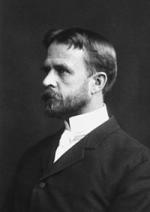Disable ads!
Thomas Hunt Morgan
Thomas Hunt Morgan Johns Hopkins yearbook of 1891 Born (1866-09-25)September 25, 1866 Lexington, Kentucky Died December 4, 1945(1945-12-04) (aged 79) Pasadena, California Nationality United States Fields Geneticist Embryologist Institutions Bryn Mawr College Columbia University California Institute of Technology Alma mater University of Kentucky (B.S.), Johns Hopkins University (Ph.D.) Doctoral students Nettie Maria Stevens John Howard Northrop Hermann Joseph Muller Calvin Bridges Alfred Sturtevant Known for Drosophila melanogaster Linked genes Notable awards Nobel Prize in Physiology or Medicine (1933) Copley Medal (1939) Signature Thomas Hunt Morgan (September 25, 1866 – December 4, 1945) was an American evolutionary biologist, geneticist and embryologist and science author who won the Nobel Prize in Physiology or Medicine in 1933 for discoveries elucidating the role that the chromosome plays in heredity. Morgan received his PhD from Johns Hopkins University in zoology in 1890 and researched embryology during his tenure at Bryn Mawr. Following the rediscovery of Mendelian inheritance in 1900, Morgan's research moved to the study of mutation in the fruit fly Drosophila melanogaster. In his famous Fly Room at Columbia University, Morgan demonstrated that genes are carried on chromosomes and are the mechanical basis of heredity. These discoveries formed the basis of the modern science of genetics. During his distinguished career, Morgan wrote 22 books and 370 scientific papers. As a result of his work, Drosophila became a major model organism in contemporary genetics. The Division of Biology which he established at the California Institute of Technology has produced seven Nobel Prize winners.
 Read more on wikipedia.org Read more on wikipedia.org
 All quotes by Thomas Hunt Morgan All quotes by Thomas Hunt Morgan
 Edit Edit
|

|
|
|
|
|
Background photo by Giuliana
|